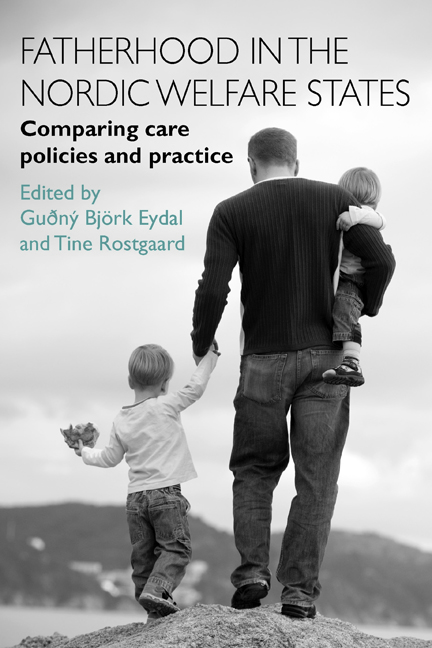Book contents
- Frontmatter
- Contents
- List of tables and figures
- Notes on contributors
- Acknowledgements
- one Introduction
- Theme 1 Fathers, families and family policies
- Theme 2 Fathers in everyday life – culture, work and care
- Theme 3 Constructing fatherhood in different family settings
- Theme 4 Caring fathers and paid parental leave policies
- Theme 5 International reflections on findings
- Conclusions
- Index
thirteen - The coming and going of the father’s quota in Denmark: consequences for fathers’ parental leave take-up
Published online by Cambridge University Press: 04 March 2022
- Frontmatter
- Contents
- List of tables and figures
- Notes on contributors
- Acknowledgements
- one Introduction
- Theme 1 Fathers, families and family policies
- Theme 2 Fathers in everyday life – culture, work and care
- Theme 3 Constructing fatherhood in different family settings
- Theme 4 Caring fathers and paid parental leave policies
- Theme 5 International reflections on findings
- Conclusions
- Index
Summary
Introduction
The pursuit of gender equality is said to constitute one of the main characteristics of the Nordic welfare model, in the labour market and private sphere alike, as well as one of the primary societal values. As Ellingsater and Leira (2006, p 7) write, ‘gender equality is integral to Scandinavian citizenship.’ Gender equality is perceived as being not only equality of opportunity, but also equality of outcome, and the gendered division of unpaid and paid work is particularly central. The gender equality model is therefore also the model which is predominantly presented and promoted in Nordic parenthood policies (Leira, 2006), as exemplified in the parental leave scheme, which is dominated by the effort to reconstruct gender and gender relations towards more active fatherhood.
Apart from extending the provision of childcare (see Eydal and Rostgaard, 2011), the Nordic countries (Denmark, Finland, Iceland, Norway and Sweden) have consequently all geared their leave policies towards the inclusion of fathers in the rearing of young children by introducing paternity and parental leave schemes. Four of the countries (Denmark, Iceland, Norway and Sweden) also introduced a father's quota in the late 1990s-early 2000s, which is an individual, non-transferable entitlement to a number of weeks of parental leave based on the ‘use-it-or-lose-it’ principle, in order to encourage fathers to take leave, while Finland instead introduced a gender bonus leave, recently converted into a fully fledged father's quota. In this manner, the Nordic countries followed the common path of political fatherhood policies, and had the most progressive state policies regarding gender equality and active fatherhood worldwide at the dawn of the new millennium, rendering the Nordic case unique and an exemplar for the generation and implementation of gender equality policies (Eydal and Rostgaard, 2012).
But not all countries still belong to what Lister (2009, p 242) calls ‘the Nordic Nirvana of gender equality’. As of 2002, the Danish father's quota was eliminated for the sake of (again) allowing the family the decision of which parent should take the parental leave. Danish fathers still hold individual but transferable entitlement to take parental leave, but no longer with the strong and efficient incentive for take-up constituted by the father's quota (Haas and Rostgaard, 2011).
- Type
- Chapter
- Information
- Fatherhood in the Nordic Welfare StatesComparing Care Policies and Practice, pp. 277 - 302Publisher: Bristol University PressPrint publication year: 2014



